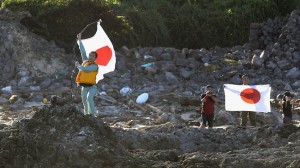If the readers have been following anything regarding East Asia on Twitter, CNN, Facebook, or any other social media, it is very clear that the situation is far from stable. Of course, I could be talking about recent threats and provocative statements from North Korea, but there is another pair of countries who brought the focus of the world’s attention with their territorial disputes: Japan and People’s Republic of China (PRC).
About a month or two ago, the tensions rose as Japan’s dispute with PRC over the Senkaku/Diaoyu Islands were being reported and the public’s concerns about a possible Sino-Japanese War were heightened. This significant prediction was made as Japan’s re-elected Prime Minister Shinzo Abe declared his more hard-lined response towards their territorial sovereignties. Also, there have been speculations of Japan’s stationing of their most advanced fighters on Shimoji Jima islands in order to counter any Chinese threats on the Senkaku/Diaoyu Islands.
Before I go further, I would like to admit that my interpretations of this situation will have flaws, but international politics is never perfect.
It is yet doubtful that these two nations will enter any major war to protect their alleged “ownership” of these islands. Yes, of course, there is a possibility that Chinese and Japanese ships and aircrafts will confront each other, which might lead to a small skirmish. On the other hand, it is more likely that both sides are gambling with the situation in this region. It is also likely that neither Abe nor Xi Jinping of China wishes to destroy global coexistence solely for their ownership over these tiny islands. Here are two main reasons why.
1. Neither side is sure of its military superiority.
Simply put, for China, their modernized navy and air force are constantly being questioned for their effectiveness; for Japan, their “ace in the hole,” US support, is not guaranteed.
The People’s Liberation Army has been modernizing rapidly and increasing their numbers, but many analysts have questioned its actual capabilities due to their lack of training and rapid growth. China’s most possible main weapon of war would be their new aircraft carrier Liaoning, which in reality is under constant skepticism of its actual battle effectiveness. On the other hand, Japan’s Maritime Self-Defense and Air Self-Defense Forces modernized during the Cold War alongside the US. For the time being, the quality of weapons and training for both countries is uncertain.
For Japan, however, despite their training-qualified (at least by the Western standards) maritime and air forces, their greatest weakness is in numbers. Therefore, Japan will have agreater chance of victory with US assistance — which is not a certain alliance at this point.
Whether the US will intervene or not, though, will stop the war either way. If the US intervenes, it is most likely that China will cease their military mobilization. If the US doesn’t, that will very possibly halt Japanese advancement.
2. The cost of war will devastate both nations’ economies.
Whether or not a nation has a more powerful military force than the others, the most important consideration a nation’s government should keep in mind before going into a major physical conflict is the financial consequences. The cost of a war between the second and third largest economic powers is not the same problem NATO faced when they intervened in Libya.
Even though the benefit of winning the resources under these islands might be enormous, they are not predicted to be exceeding the cost of a military conflict between these two nations. Moreover, an already crippled global economy will definitely deteriorate if Japan and PRC do go into war.
More importantly, win or lose, for either nation, a third Sino-Japanese War will devastate both nations’ domestic industries. This, ironically, is due to both nations’ economic interdependence that is holding each nation’s feet. War between these nations will put an immediate halt to Abe’s economic recovery plan. For Japanese companies whose biggest customers are Chinese consumers, they will be forced to pull back from the Chinese market due to the situation. This will, consequently, affect the Chinese also by taking away half a billion Chinese workers’ jobs.
The war between these two nations will definitely inevitably burden these two economic powers into a depression.
There are numerous other reasons why they wouldn’t go to war, such as PRC’s willingness to improve relations with other nations (which will not be achieved if they choose to use military force as their solution) and Japan’s other territorial disputes with Russia and South Korea (as the war would imply an aggressive attitude towards these countries.) One thing is positively sure: the Third Sino-Japanese War will leave nothing but economic and human devastations for not only China and Japan but also for the rest of the world.
Lee is a member of the class of 2016.






